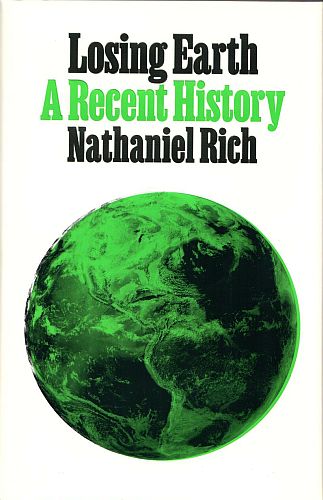

| LOSING EARTH A Recent History Nathaniel Rich New York: Farrar, Straus & Giroux, April 2019 |
Rating: 4.5 High |
|||
| ISBN-13 978-0-374-19133-7 | ||||
| ISBN-10 0-374-19133-6 | 206pp. | HC/BWI | $25.00 | |
There's a nice contrast between Losing Earth and Bill McKibben's Falter, the book I read just before. McKibben's book is scholarly and erudite; it develops multiple themes across chapters filled with complex sentences. This book reads like a novel.1
It documents the lost decade of 1979-1989, when the severity of climate change became apparent to the American public: a decade lost to those who entered into it hoping for concrete political action in America on climate change. The decade began with solid knowledge about the basic science; indeed, that had been developed a century before. And as the years went by, research built on that foundation until finally the signals of burgeoning human-caused climate change began to emerge from the noise of natural variations.
But something else was burgeoning during that decade: a right-wing reactionism that, even while it gave public lip service to the need for strong responses to the effects of rising global temperatures, strove mightily and largely effectively behind the scenes to make sure those strong responses never materialized.
Rich breaks his narrative up into discrete periods of time, which often revolve around some conference, a Congressional hearing, or a private meeting of some sort. Along the way, he doesn't hesitate to name heroes and villains, and there are plenty of both.2 His Afterword, "Glass-Bottomed Boats," summarizes the contentious process and gives us a benchmark for the present time.
"Where we are today: More carbon has been released into the atmosphere since November 7, 1989, the final day of the Noordwijk conference, than in the entire history of civilization preceding it. Earth is now as warm as it was before the last ice age, 115,000 years ago, when the seas were more than twenty feet higher. In 1990, humankind emitted more than 20 billion metric tons of carbon dioxide. In 2018, we were projected to have produced 37.1 billion metric tons—a record. Since the turn of the twenty-first century, the world's fastest-growing energy source has been coal. Despite every action taken since the Charney report—the treasure invested in research and renewable energy, the nonbinding treaties, commitments, and pledges—the only number that counts, the total quantity of emitted greenhouse gases, has continued its inexorable rise." – Page 180 |
So the technical picture has gotten worse. And what of the politics?.
The political story hasn't changed greatly either, except in its particulars. Sununu is correct that, to this day, even some of the nations that have advocated most aggressively for climate policy—among them the Netherlands, Canada, Denmark, and Australia—have failed to honor their own commitments. William Nordhaus has diagnosed the problem succinctly: "Countries have strong incentives to proclaim lofty and ambitious goals—and then to ignore those goals and go about business as usual." Only seven countries are close to limiting emissions at the level to keep warming to 2 degrees: India, the Philippines, Gambia, Morocco, Ethiopia. Costa Rica, and Bhutan. When it comes to the United States, which has not deigned to make any binding commitments whatsoever, the dominant narrative for the last quarter century has concerned the unrestrained efforts of the fossil fuel industry, compounded by the ingratiating abetment of the Republican Party, to suppress scientific fact, confuse the public, and bribe politicians. – Page 181 |
By dint of his exceedingly detailed account of the events of this crucial decade, Nathaniel Rich has given us a grimly compelling tale of contending factions. I detected only one mistake of grammar, punctuation, or spelling. The only defect in the book is its lack of Endnotes and Index. (There is a "Note on Sources" which lists several books.) Despite this lack, I consider the book a keeper — and certainly a must read. But I will mark it down one notch.
We are fortunate that this tale, grim as it has been so far, is not yet over. I'll give Nathaniel Rich the last word.
"Everything is changing about the natural world and everything must change about the way we conduct our lives. It is easy to complain that the problem is too vast, and each of us is too small. But there is one thing that each of us can do ourselves, in our own homes, at our own pace—something easier than taking out the recycling or turning down the thermostat, and something more valuable. We can call the threats to our future what they are. We can call the villains villains, the heroes heroes, the victims victims, and ourselves complicit. We can realize that all this talk about the fate of Earth has nothing to do with the planet's tolerance for higher temperatures and everything to do with our species' tolerance for self-delusion. And we can understand that when we speak about things like fuel-efficiency standards or gasoline taxes or methane flaring, we are speaking about nothing less than all we love and all we are." – Page 204 |

 To contact Chris Winter, send email to this address.
To contact Chris Winter, send email to this address.